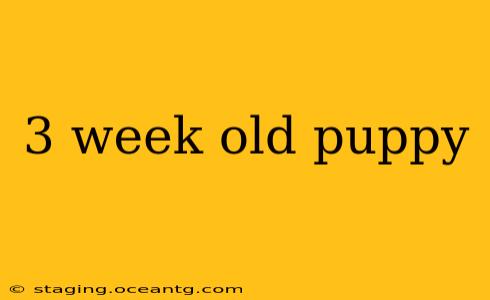Having a 3-week-old puppy is an incredibly rewarding but demanding experience. These tiny bundles of energy require constant care and attention. This guide will delve into the crucial aspects of caring for a puppy at this delicate stage, addressing common concerns and providing expert advice to ensure your new companion thrives.
What is the Development Stage of a 3-Week-Old Puppy?
At three weeks old, your puppy is still very much a newborn, entirely dependent on its mother for warmth, nourishment, and protection. This is a crucial period of rapid growth and development. Their eyes and ears are likely just beginning to open, and their coordination is still rudimentary. They're starting to explore their surroundings, albeit clumsily, and exhibiting playful behavior with their littermates. Think of it as the toddler stage of puppyhood – lots of learning, stumbling, and adorable mischief.
What Should I Feed a 3-Week-Old Puppy?
Is it okay to feed a 3-week-old puppy? Generally, a 3-week-old puppy should still be nursing from its mother. This provides essential antibodies and nutrients crucial for their immune system development. However, if the mother is unable or unwilling to nurse, or if there are multiple pups and the mother is struggling to provide enough milk, your veterinarian may advise supplemental feeding. This usually involves specialized puppy milk replacer, which you must prepare carefully according to the package instructions. Never attempt to feed a 3-week-old puppy cow's milk or other substitutes without consulting a veterinarian; it can be very harmful.
How Often Should I Feed a 3-Week-Old Puppy?
As mentioned above, the ideal feeding schedule for a 3-week-old puppy involves frequent nursing from its mother. If supplemental feeding is necessary, the frequency and amount will be determined by your veterinarian, based on the puppy's weight, size, and health.
How Much Sleep Does a 3-Week-Old Puppy Need?
Three-week-old puppies sleep a lot! They need ample rest to support their rapid growth and development. Expect them to sleep for the majority of the day, interspersed with short bursts of activity, nursing, and elimination. Providing a warm, safe, and quiet environment for sleep is critical.
When Should I Take My 3-Week-Old Puppy to the Vet?
Regular veterinary checkups are essential for any puppy, especially one so young. You should consult a veterinarian if you notice any signs of illness or distress, such as:
- Lethargy or lack of energy.
- Difficulty nursing or refusing to eat.
- Diarrhea or vomiting.
- Unusual respiratory sounds or labored breathing.
- Discharge from the eyes or nose.
- Failure of the eyes or ears to open within the expected timeframe.
How Do I Stimulate a 3-Week-Old Puppy's Development?
While your puppy's main focus should be nursing and resting, you can begin gently introducing some stimuli to promote their sensory development. Short periods of gentle interaction, such as stroking their fur and talking to them softly, can be beneficial. Introduce them to a variety of safe, soft textures and sounds. Always monitor their response, and ensure interactions remain calm and non-stressful.
Should I Start House Training a 3-Week-Old Puppy?
No, it's too early to start formal house training at this age. Puppies at three weeks old lack the bladder control necessary for effective training. Focus on providing a clean and comfortable environment. The mother will typically handle elimination with her litter.
When Can I Start Handling a 3-Week-Old Puppy?
Gentle handling from a young age is important for socializing your puppy. Short, gentle interactions will help your puppy get used to human touch and build confidence. However, avoid overwhelming the puppy with extended sessions.
This guide provides a comprehensive overview of caring for a 3-week-old puppy. Remember that every puppy is different, so observe your pet's behavior closely and don't hesitate to consult your veterinarian for any concerns. Early veterinary intervention can prevent more significant issues down the line and ensures your puppy has a healthy and happy start to life.
